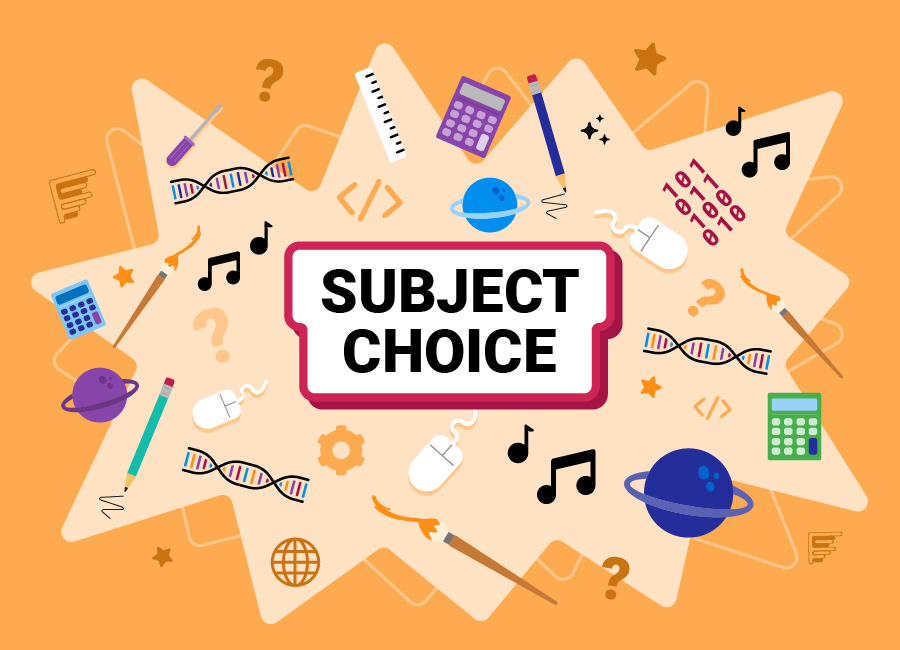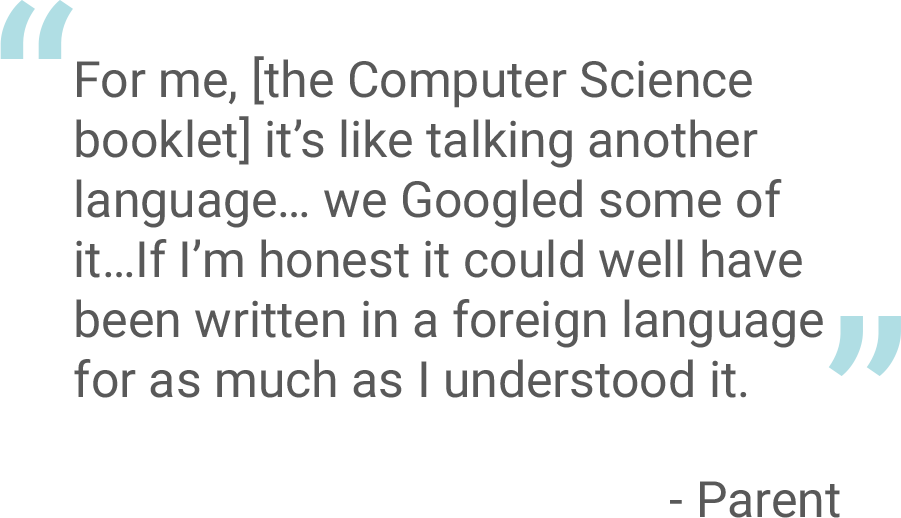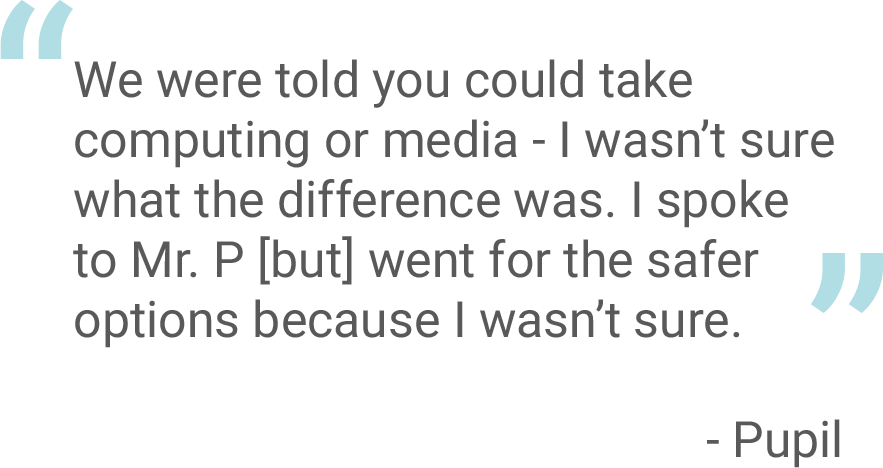
Options booklets and evenings present a variety of different elective subjects for students aged 13—14 and are crucial in influencing GCSE subject choices, including Computer Science, among pupils. These materials provide insights into various subjects, shaping perceptions that can impact final decisions. Researchers from the Behavioural Insights Team (BIT) conducted a series of exploratory studies to investigate how the way that Computer Science is presented in options booklets and options evenings could be improved.
| Date range of intervention | October 2021–July 2022 |
| Age of participating students | 12–14 year old students, parents of secondary school students, secondary school teachers and school leaders |
| Aim of study | To explore why computing is frequently overlooked as an elective subject by female students and address the research question: “How is Computer Science (CS) presented in options booklets and options evenings, and could these be adapted to encourage more girls to choose it?” |
| Study and method | Researchers conducted five separate exploratory studies: (1) a review of the academic evidence on subject selection (2) semi-structured interviews with pupils, teachers and parents from 20 secondary schools to explore how CS is presented in options evenings and options booklets, how pupils, parents and teachers perceive the subject, and to understand their experiences of taking part in the options process (3) observation of options evenings at ten secondary schools to see how CS was presented as a subject, how that compared to the presentation of other subjects and how pupils and parents engaged with CS as an option. (4) analysis of the language of CS and Geography descriptions in 230 options booklets to compare whether the language used could be considered more ‘male’ or ‘female’ (5) a national survey of over 4,100 secondary teachers and school leaders who were asked “To choose Computer Science as a GCSE option, which of the following criteria apply to students at your school?” and were given a range of options describing formal or informal criteria related to maths and language attainment |
| Analysis | Researchers from BIT analysed the data collected from each exploratory study as follows: (1) Data from interviews was analysed using thematic analysis (2) The GloVE model was applied to the data collected from options booklets to determine to what extent (3) Data from observations and the national teacher survey were aggregated along with the qualitative data results |


Three categories of barriers were identified that currently affect girls’ decisions to take GCSE Computer Science (CS):
| Capability | CS is not well understood by parents and pupils Some non-CS teachers are unable to provide information about CS GCSE Pupils are unaware of the range of careers CS is related to |
| Motivation | CS descriptions use unfamiliar and male language – we found that Computer Science subject descriptions are significantly more male than Geography CS is presented as a ‘hard‘ option that requires advanced maths Girls’ previous experiences of CS are often negative or off-putting Concern that a pupil will be the only girl taking CS Role models are lacking |
| Opportunity | Girls might have structural constraints around the options they can pick Some senior leadership teams are not prioritising CS as an option |
Several obstacles may deter girls from selecting Computer Science GCSE. One issue is that the descriptions in options booklets often use complex and masculine language, which is noticeably more ‘male’ compared with the language used for Geography. Moreover, many parents lack a good understanding of Computer Science and tend to direct their children towards subjects they know better. Additionally, some pupils are not aware of the various career opportunities that studying Computer Science can offer.
Based on the identified barriers, we recommend using the following checklist when designing GCSE Computer Science options material, including booklets and presentations at options evenings:
Further school-level recommendations include implementing parental messages that aim to improve parental perceptions of Computer Science. Ideally, a bundle of recommendations would be combined to a) incentivise schools to prioritise CS GCSE and b) equip teachers and school leaders with ideas to encourage more girls to choose it.
Childs, K. (2021). Factors that impact gender balance in computing. In Understanding computing education (Vol. 1). Proceedings of the Raspberry Pi Foundation Research Seminars.
Leonard, H. C., Quinlan, O., & Sentance, S. (2021, September). Female pupils’ attitudes to computing in early adolescence. In Proceedings of the 2021 Conference on United Kingdom & Ireland Computing Education Research (pp. 1-6). (Open-access author copy, presentation slides, and video presentation)